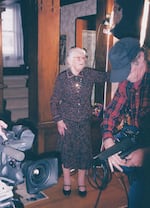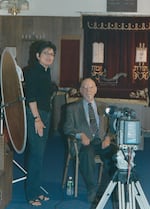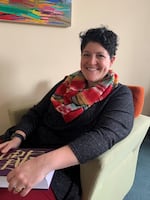Beginning in the 1950s, when Portland had far fewer coffee shops and most people had never touched a computer, three men arrived in the city, all with the same vocation, to begin work that would touch the lives of thousands of Oregonians.
All three would witness, and even play a role in, some of the most important social changes of the 1960s through the 1990s from a unique vantage point: They were rabbis, here to lead their congregations into the 21st century.
Fifteen years ago, OPB interviewed all three men for a documentary about their lives and work.
After almost half a century of being at the helm of Portland's largest synagogue, Congregation Beth Israel, Rabbi Emanuel Rose died on Feb. 7, 2020. Shortly before that, Rabbi Joshua Stampfer, rabbi of Congregation Neveh Shalom for 40 years, died on Dec. 26, 2019. Rabbi Yonah Geller, who led Congregation Shaarie Torah for 40 years, died Nov. 15, 2007.
With the passing of all three men, we look back on the making of the film and celebrate their tremendous contributions to Oregon.
A story takes root
"I was a little girl with no aunts or uncles as my parents were New Yorkers and moved West to raise a family," said Gloria Hammer. "When I was growing up in West Linn, I remember other children saying, 'You don't even have a minister.' I would reply, 'I have three rabbis.'" "Saturdays and Sundays we often went to services at Shaarie Torah and both Rabbi Geller and his wife were friendly. Sunday mornings we went to Sunday School at Neveh Shalom with Stampfer and earlier years at Temple Beth Israel in Hebrew school." "I think as a little girl I felt like they were extended family."
That feeling stayed with Hammer, a writer and educator. Years later she shared an observation with her friend Charlie Schiffman, who was then head of the Portland Jewish Federation.
“We both love radio and the media and discussed news and great stories. I had one recurring subject that I kept talking about: Stampfer, Rose and Geller being at the helm of the largest congregations for some 30 years. You could not find another city that had three men representing the Orthodox, Conservative and Reform movements that were serving this long in a city across the country. I saw it as a story that needs to be captured. Charlie agreed. Charlie was my mentor. He kept telling me, ‘You can do this.’”
A letter and a green light
Jeff Douglas, at that time OPB's vice president of local production, received a letter from Hammer seeking support for the project. "Jeff got back to me within a few days of sending the letters. We met on the steps of OPB. Within a few minutes he said, 'this is a great story.'"
A documentary production team from OPB, including Jessica Martin and Kate McMahon, got to work. Hammer knew not only the rabbis, but also what issues were relevant to the community, and led the team to places of historic significance. She also suggested key people who needed to be in the film to tell the story of the Jewish community in Portland.
The team interviewed not only the rabbis and their wives but also long-time residents with personal knowledge of the history of the community, including Milt Carl, president of the B’nai Brith Men’s Camp Association for 35 years, and Augusta Reinhardt, who was 97 at the time of her interview.

Augusta Reinhardt and OPB's William Ward preparing for her interview
Gloria Hammer
Former KGW news anchor Pete Schulberg narrated the film.
“Pete Schulberg, who, when growing up in the non-Jewish town of West Linn, it was important to see him doing the nightly news,” said Hammer. “It felt like we weren’t the only Jews.”
Music for the film was composed by Tom Grant. Michael Allen Harrison and several other well-known Oregon musicians also contributed to the soundtrack. Part of a performance by the Portland Chamber Orchestra under the direction of Maestro Yaacov Bergman punctuates the halfway point of the film. The art for the opening of the program and the cover of the DVD was created by Greg Cohen, an artist Hammer had once judged in the Oregon Holocaust Resource Center’s student art competition.
“I remember awarding him first place years earlier,” she said.
The interviews
The crew set about filming ceremonies and classes, exploring historic neighborhoods, and of course conducting many interviews. The rabbis were open, sharing personal histories and stories about everything from their interfaith work to how they met their wives.

Gloria Hammer and Rabbi Yonah Geller at Congregation Shaarie Torah
Gloria Hammer
“Their interviews were exceptional. It was a joy listening to them,” said Jessica Martin, currently Executive Producer for OPB’s Oregon Art Beat.
“And it was a challenge to capture even a little of all three men’s accomplishments in one program. From creating the Institute of Judaic Studies and the Oregon Jewish Museum to working for civil rights and peace – there’s so much more than we could even touch on. The way they worked together for the good of the community – that continues to resonate throughout the city, for everyone.”
The interviews turned into an award-winning film, broadcast on multiple PBS stations around the country.
“When I first moved to Portland 9+ years ago, the first two things I was given to learn about the community were the most recent Jewish Federation Annual Report and an incredible OPB produced documentary called 'The Three Rabbis',” said Marc Blattner, President and CEO of the Jewish Federation of Greater Portland.
“The documentary highlighted the indelible imprint Jews have made on the Pacific Northwest. And the focus was on three incredible men who helped shape the city for the last half-century — Rabbi Yonah Geller, Rabbi Emanuel Rose and Rabbi Joshua Stampfer. Though each hailed from a different branch of Judaism, they came together to inspire a Jewish community for over four decades.”
Changes in the new century
“In the sacred places of the Synagogue the rabbis were on a pulpit,” Hammer said. “Now it is more casual, and the rabbis are closer to their congregants. Their clothing is less formal. There are more women in the clergy.”
Originally from Ohio, Rabbi Rachel Joseph came to Congregation Beth Israel eight years ago. She recently married her wife under the dome at the synagogue she helps lead.

Rabbi Rachel Joseph of Congregation Beth Israel
Gloria Hammer
“How amazing, I can come here and be a Rabbi at the largest synagogue in the state with people that have been here for five generations or who moved here, working with people in their lives from birth to death,” said Rabbi Joseph. “I have pushed this congregation in lots of directions.”
And through struggles comes progress.
"My brother came out in the early '70s at 19. Larry was one year older than me," Hammer said. "Larry died of AIDS. He was 39." "It was a time when religious support was challenging."
“It was a complicated time,” said Rabbi Joseph. “If you look around the country, there are queer synagogues all over. Most of them were started in the ‘60s and ‘70s, by lesbians taking care of dying gay men. One of the most famous is in San Francisco, Sha’ar Zahav Synagogue. They have their own prayer book, Siddur Sha’ar Zahav, because they also saw the need for queer people to have prayers and readings that speak to them.”

Siddur Sha'ar Zahav prayer book
Gloria Hammer
“The three rabbis expressed that they had to abide by The Board of Rabbis within their Orthodox, Conservative, and Reform Movements at the time,” said Hammer. “But by 2000, many new congregations, meeting the needs of the community, had been organized and thriving.”
“Rabbi Geller was quick to answer when I asked him questions concerning how the gay community was not accepted years ago and he was quick to say, 'Times have changed,'" remembers Hammer. “I think that we all can agree that a lot has changed in the last quarter of a century.”
Rabbi Joseph adds, “I would argue that today, while I have been a part of many of these queer synagogues over the years in these different places that I have lived, part of what I really appreciate about being a rabbi at Congregation Beth Israel is we do not need to segment our society anymore. Let’s all be part of one community. We have lots of people of color, we have lots of gay people we have all different sorts of people as part of our community. The Jewish people are stronger because of that.”
15 years later
“When I think back on it now, I’m so honored to have met all three rabbis and their wives,” said Jessica Martin. “The fact that they gave of their time to us, patiently answering all our questions, and sharing their knowledge — what a gift. The time I got to spend with them, and with the production team, was very special to me.”
“One of my favorite gifts is the letter Rabbi Stampfer sent,” said Hammer, referring to a handwritten letter she received after the broadcast. “He is so honest. He expresses that when I came to him with the idea that he was impressed but he really felt that it was beyond my reach. He congratulates me and says all credit to you. It makes my heart sing.”

A letter from Rabbi Joshua Stamper.
Gloria Hammer
Today, there is a new generation of rabbis leading the three congregations.
“The Three Rabbis left behind deep roots and blossoming branches,” said Rabbi Joseph. “They laid the foundation for which we are building Judaism for the 21st century. They laid that groundwork. They took a place that was just beginning to evolve, and they put their mark on it in a way that Portland would be a national voice.”
There is still a familiar name leading one of the congregations. Rabbi Joshua Rose, rabbi at Shaarie Torah, is Rabbi Emanuel Rose’s son.
“The legacy of these three giants continues to move and shape the Portland Jewish community, said Rabbi Rose, “My Dad had a special relationship with Rabbis Geller and Stampfer that was just extraordinary and nowadays pretty uncommon. Their differences were clear and their mutual respect undeniable. As a very proud son, it was deeply moving for me to see a perspective on my father's incredible lifework, along with that of these other two Jewish greats with this film. Thank goodness for all of us that Gloria did such a beautiful job of capturing this profoundly important phase in the history of Jewish Portland.”
“So much has changed in the last twenty years. It is a whole new Jewish community,” said Hammer, “and I am so glad that we captured an era.”